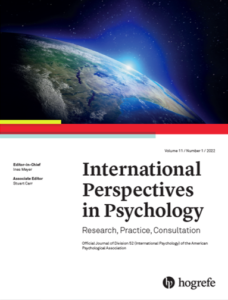
May 2023 – Volume 27, Issue 2
Table of Contents
Message from the President
Division News
- Division 52 at APA 2023
- Join Division 52 International Environmental Justice Committee at APA
- Division 52 Student-or ECP First-Authored Poster Contest APA 2023
- APA Council Report from Dr. Merry Bullock
- Memorial in New York saluted Jean Lau Chin
- The APA Division of International Psychology: A Multilingual History
- What is the Division 52 International Committee for Women?
Member Spotlight
- Robert Morgan, PH.D.
Global Perspectives
- Human Rights in Uganda: I Want to be Museveni’s Side Chic
- Division 52 Webinar Examined Internationalizing Psychology Courses
United Nations Activities
- 1,000 Women fill a NYC Block to get their Day Pass for the 2023 UN Women’s Conference
- UN Psychology Day 2023 Focused on the Promotion of Peace
Early Career Professional Corner
- Division 52 ECP Events at APA 2023
Student Corner
- Candidates Statements- Student Chair-Elect 2024
- Division 52 Student Events at APA 2023
Webinars
Member Activities
- Publications
- Awards / Honors / Accomplishments
International Perspectives in Psychology
Announcements and Opportunities
- International Psychology–Two new resources from Geneva for World Disasters and MHPSS
Artistic Expressions
- The Night Principal by Robert Morgan, PH.D.
Note from the Editor
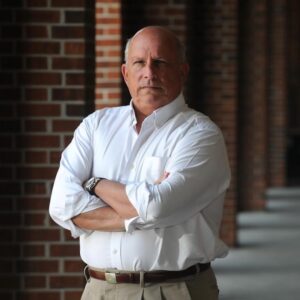 Message from our President
Message from our President
Antonio Puente, PhD
52 and Me
APA Services, Inc, the C6 section of APA dedicated to addressing the needs of psychologists, recently discovered that the main reason members join and remain as part of APA is identity. And the main connection to such an identity is engagement. In an effort to encourage you to make APA reflect a truly global perspective, to make sure that that perspective is bidirectional, and your vision of psychology is reflected in what APA and psychology should be about, I personally invite you to attend APA, either in person or virtually. There are numerous exciting and special activities at our upcoming APA convention in August in Washington, DC. Please see the program (APA Division 52 Program online) to see what our Program Chairs, Carlos Zalaquett and Erinn Cameron, have put together for us.
Let me share some “secrets.” We have an outstanding convention program accessible only if you register, but we also have special activities hosted in our Hospitality Suite that we will make available, free and by Zoom. We are covering the international scene with presentations that are clinical and academic, that involve residents of the US and the world, and that involve seasoned and newer members of our discipline. But we are also giving a special award (with a virtual appearance) to Phil Zimbardo for making psychology a truly global experience. And, here’s hoping that our negotiations with the US Ambassador from Ukraine will accept our initiation to receive a special commendation during our joint social hour with Divisions 46 & 48.
So, please make sure that 52 is YOU and that YOU is 52 by either registering for either the APA conference (registration here) or joining us for the Hospitality Suites activities.
 Division Elections are Underway – VOTE NOW!!!
Division Elections are Underway – VOTE NOW!!!
This is your opportunity to make your voice heard!! Vote now in the Division 52 election for President-Elect, Treasurer, ECP Chair-Elect, and Student Chair-Elect (only students vote for this position).
Candidates Running (you can see their bios and candidate statements here)
President-Elect: Michele Ribeiro, Martha Zlokovich
Treasurer: Scarlett Choi; Laura Dryjanska
ECP Chair-Elect: Erinn Cameron
Student Chair-Elect: Antonios Kagailis, Olivia Mounet, Guolin Zhang
TO VOTE: You should have received an email from APA with a unique link to your ballot. Alternatively, log on to MyAPA (www.apa.org) or here to see your own APA member account and link to the ballot.

Division 52 at APA 2023
International Reception: TBD
Social Hour with Divisions 46 & 48: Friday, August 4th, 6-7:50 pm, Marriot Marquis Level 4 Liberty Salon L
Presidential Address: Friday, August 4th, 4-5:00 pm, Marriot Marquis Level 4 Liberty Salon L
Business Meeting and Awards Ceremony: Friday, August 4th, 5-6:00 pm, Marriot Marquis Level 4 Liberty Salon L
Hospitality Suite Highlights
The Division 52 Hospitality Suite will be in the Marriott Marquis this year (room number announced in July). The Marriott Marquis will also serve as APA headquarters and is the closest hotel to the convention center. In addition to hosting many exciting presentations and events, the hospitality suite will be open until 7:30 pm each day for relaxing, socializing, and refreshments throughout the convention.
Thursday, August 3rd
8:00-9:00 am Division 52 Fellows Breakfast
2:00-2:50 pm Symposium 2.0: Psychosocial experiences and cultural adjustment of migrants and refugees: Coming to the USA
Presenters: Grant Rich & Brigitte Khoury
6:00-7:30 pm Division 52 Student & ECP Social- Dinner
Friday, August 4th
8:00-9:30 am International Environmental Justice Committee & International Perspectives in Psychology- Breakfast
11:00-11:50 am Symposium 2.0: Acculturative stress in minority communities
Presenters: Joyce Yip-Green & Karen Brown
1:00-2:30 pm International Women’s Committee Meeting & Social- Lunch
3:00-4:00 pm Symposium 2.0: Using the Listening Guide for understanding the emotional impact of the Uvalde school shooting
Presenters: Deborah Stiles & Diana Carvajal Endara
Saturday, August 5th
10:00-11:00 am Open Mic Poetry Reading- Featuring Annah Ashbah -light refreshments
12:00-1:00 pm Scientific Committee for Cross-Cultural Research Meeting & Social with cross-cultural research presentations by Patrick A. Robertson and Diana Carvajal Endara- light refreshments
Join the Division 52 International Environmental Justice Committee at APA 2023!
What: Breakfast in the Division 52 Hospitality Suite
When: Saturday, August 5th, 8:00 – 9:30 am EST
Hosted by: International Environmental Justice Committee & International Perspectives in Psychology
Come and join us for breakfast a meet International Perspectives in Psychology Guest Editors Erinn Cameron, Luca Tateo, Gonzalo Bacigalupe, and Associate IPP Editor Joy Mendiola Teng-Calleja. We will discuss the IEJC current special issue: “Environmental Justice and Psychology: Alternative Ideas on Environmental Issues.” You will also have a chance learn about publishing in our division’s journal. Our primary topic will be special issues. Have you ever wondered how to submit a proposal for a special issue of IPP? You will also learn about current special issues, how to submit manuscripts, and how the review process works. Have you ever thought about being a guest editor? Of special interest will be the current special issue put forward by the IEJC (please see below). Following breakfast, please join us at the main convention for our IEJC symposium.
What: Symposium: “Towards a new way of understanding and promoting international environmental justice in psychology
When: 10:00 -10:50 am EST
Where: Walter E. Washington Convention Center, Level 1, Room 146A
See Special Issue Call for papers here
Division 52 Student or ECP First-Authored Poster Contest APA 2023
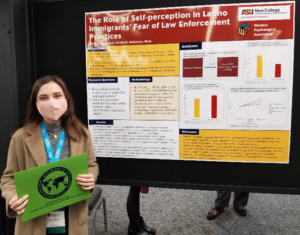 It’s time for our yearly Student or ECP first-authored poster competition! Enter your poster today! Posters with “internationally interesting” content are eligible when:
It’s time for our yearly Student or ECP first-authored poster competition! Enter your poster today! Posters with “internationally interesting” content are eligible when:
- The poster has already been accepted for presentation at the APA Convention or one of the “APA-adjacent” events, such as in a division’s hospitality suite or social hour.
- Students or ECPS (Early Career Professionals within their first ten post-doctoral years) are first-authors; co-authors may be non-students, professionals, and faculty members.
- If the first author is no longer a student (e.g., recently graduated) but the work (e.g., dissertation, masters thesis, senior honors thesis) was completed during the educational program, the poster is eligible for the contest.
To submit the poster to the contest, please upload it to the poster submission portal by Friday, July 21st, 2023. Because we understand that many posters will be assembled and printed over that weekend, a “solid draft” of the poster is an acceptable submission. Posters will only be included in the contest if they are submitted via the portal. Please do not separately e-mail your poster or ask for additional confirmation of its receipt.
The poster contest also requires volunteers to judge posters (reviewed via Qualtrics in advance of the contest) and to distribute award certificates at the convention. Contestants are invited to participate in both roles. Sign up to help with this volunteer survey.
Please help us spread the word about the contest by forwarding/sharing this notice with others.
Please direct questions/inquiries to the Poster Contest Coordinator, Lynette Bikos, Ph.D., lhbikos@spu.edu
Division 52 Council Representative Report
Merry Bullock, Ph.D., Division 52 Representative
 The next APA Council meeting will be in August at Convention. The Caucus for Promoting Global and Global Human Rights Perspectives will be active with one New Business Item on the agenda (to give a stronger voice to APA’s Committee on Global Psychology in helping set council’s policy agenda), and others in the works, including a resolution in support of the needs of international students and faculty, and a resolution to develop guidance for APA on how to respond to armed conflicts around the world.
The next APA Council meeting will be in August at Convention. The Caucus for Promoting Global and Global Human Rights Perspectives will be active with one New Business Item on the agenda (to give a stronger voice to APA’s Committee on Global Psychology in helping set council’s policy agenda), and others in the works, including a resolution in support of the needs of international students and faculty, and a resolution to develop guidance for APA on how to respond to armed conflicts around the world.
Memorial in New York saluted Jean Lau Chin
Harold Takooshian, Artemis Pipinelli, & Leonard Davidman

On May 6, 2023, over 40 psychologists and students gathered at Hunter College in Manhattan for a long-awaited memorial to beloved psychologist Jean Lau Chin (1944-2020), a past-President of APA Division 52. Dr. Chin and her husband, Gene, were two of the early fatalities of COVID-19 in the spring of 2020. For one hour, leaders of six psychology organizations were among those who spoke about Dr. Chin. Harold Takooshian, chair of SPSSI-NY, showed a brief video biography of the remarkable lives of Gene and Jean Lau Chin, produced by Cindy Hsu of CBS-TV, and spoke of Jean’s leadership across many APA divisions (including 9, 35, 52, and APA Council). Elaine Congress, an officer of the International Council of Psychologists, described Jean’s international work as a past-President of ICP. Leonard Davidman, past-President of the NYS Psychological Association, described how he involved Jean’s leadership within NYSPA, and he showed a video of Jean’s campaign to be the first Asian woman to serve as President of APA. Artemis Pipinelli, President of the NYSPA Division of Women’s Issues, shared many images of Jean’s years of leadership among her “sisters” in DOWI. Professor Carolyn M. Springer of Adelphi University spoke of Jean’s work as an esteemed dean, teacher, and mentor at Adelphi. Elaine Henry Olaoye, an officer of the Manhattan Psychological Association, spoke of Jean’s local leadership among psychologists in our region. With great passion, Ting Yun Tseng of Adelphi spoke about Jean as a beloved mentor. She was one of many who stepped forward to share how Jean’s life touched their own. This was the first local in-person tribute to Gene and Jean Lau Chin since the couple’s passing in 2020. The organizers thank their son Scott for his kind cooperation. This salute was part of the all-day 51st Hunter College Psychology Convention, arranged by a team headed by Professor Dawn Dugan. For any details, contact Harold at takoosh@aol.com
The APA Division of International Psychology: A multilingual history
Maria Elisa Vannoni & Harold Takooshian
Maria Elisa Vannoni is a multinational psychologist from Italy and Venezuela who currently studies at Fordham University in New York City. Harold Takooshian is a co-founder and past-President of Division 52.
“What is the history of APA Division 52, International Psychology?”
As Division 52 marked its 25th anniversary in 2022, this three-part article shares good news and a special invitation to psychologists outside North America to actively participate in Divison 52.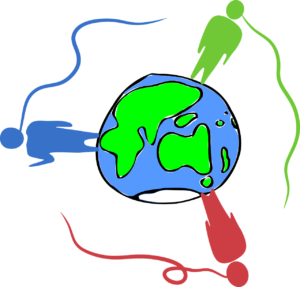
Beyond-English. Since its origins on February 21, 1997, as the first and only global division of APA, the mission of Division 52 has been to “further the development and advancement of international relations among psychologists” (Takooshian & Bais, 2017).
Though APA is a national organization, it seeks to fully engage international colleagues and students in its global activities. Part of this is to go beyond the English language when feasible, for what might be termed “language equity”—to include other languages. For example, back in 1996, to mark the 50th anniversary of the American Psychologist, Editor Raymond D. Fowler frankly opined that “Today, [U.S.] psychology can become much more international than it has been in the past” (1996, pp. 5-6), and Fowler pledged to integrate non-USA authors more into the AP—as editors, authors, and references within articles. In 2022, a quarter-century later, this remains a priority for psychologists to promote inclusivity of non-English knowledge in our publications and other work (Ong & Ocoa, 2022).
33 Languages. As of 2022, the history of Division 52 can be read online in 33 languages. These include 33 PDFs, from Amharic to Urdu.
This originated back in 2002, on the fifth anniversary of Division 52, when two future Division Presidents (John Hogan and Harold Takooshian) co-authored a simple one-page history of Division 52, suitable for translation. At that time, Rivka Bertisch Meir was the dynamic Chair of the Division’s “international liaisons committee,” in communication with psychologists across up to 80 nations. Meir invited them to translate this one-page history into their indigenous language, with themselves as the author/ translator, to post and circulate within their own nation. At the time of Meir’s passing in a tragic auto accident on August 14, 2014, her Division 52 webpage was up to 20 languages. In 2014, another dynamic, multilingual psychologist—Anjhula Mya Singh Bais—took over this unique project. Under her deft direction, for the 20th anniversary in 2017, this “Beyond English only” webpage grew to 33 languages within 4 years (Bais & Takooshian, 2017). Starting in 2022, Maria Elisa Vannoni agreed to direct this effort. Vannoni, too is a multinational psychologist who has served in Rome, Caracas, and now New York City.
Invitation. Can you translate this page into another language, listing yourself as its author/translator? If so, Vannoni offers a list of 47 new languages (from Afrikaans to Zulu), including the estimated millions of people who use that language. She now seeks psychology colleagues and students who can volunteer to prepare a one-page translation in 4 steps: (1) Contact Vannoni to pick a new language and receive the current English-language original. (2) Upon approval, translate and submit your page within four weeks, in PDF and MS Word format, naming yourself as its translator/ author. (3) Once this is posted, feel free to post or circulate this widely among compatriots. (4) All translators will receive a Certificate of Recognition for their cooperation.
For any details or to volunteer, contact Maria Vannoni soon: me.vannoni@gmail.com
Current 33 languages: Amharic, Arabic, Armenian, Bengali, Chinese-Mandarin, Chinese-Traditional, Dutch, English, Estonian, Farsi, Finnish, French, German, Greek, Hebrew, Hindi, Hungarian, Indonesian, Italian, Japanese, Kinyarwanda (Rwanda), Korean, Latvian, Malaysian, Maltese, Polish, Russian, Sinhalese, Somali, Spanish, Thai, Ukrainian, Urdu
47 future languages: Afrikaans (7 million), Albanian (16), Basque (1), Belarusan (3), Bosnian (3), Bulgarian (8), Cambodian (14), Catalan (4), Croatian (5), Czech (10), Danish (16), Esperanto (1), Galician (2), Georgian (4), Gujarati (46), Haitian Creole (7), Hausa (25), Hawaiian (.02), Icelandic (0.3), Irish (0.1), Javanese (84), Kannada (37), Khmer (14), Lao (3), Lithuanian (3), Macedonian (2), Marathi (72), Mongolian (6), Nepali (16), Norwegian (4), Portuguese (203), Punjabi (63), Romanian (23), Serbian (15), Slovak (5), Swahili (150), Swedish (9), Tagalog (24), Tamil (69), Telugu (74), Tibetan (8), Turkish (71), Vietnamese (68), Welsh (0.7), Yiddish (1), Zulu (12)
What is the Division 52 International Committee for Women? (Division 52 ICfW)
Joy K. Rice, PhD
ICfW Is Established
 The International Committee for Women, a Standing Committee of Division 52, International Psychology, has had a long and distinguished history within the division and APA. I hope that you will be interested in a brief summary of its interesting history and major accomplishments over the years.
The International Committee for Women, a Standing Committee of Division 52, International Psychology, has had a long and distinguished history within the division and APA. I hope that you will be interested in a brief summary of its interesting history and major accomplishments over the years.
Over twenty years ago, the prominence of international issues as a focus of activity and advocacy in APA was somewhat muted. There was an Office of International Affairs established in 1989 (https://www.apa.org/international/pi/2005/07/issue.pdf) and a Division 35 Global Issues Committee, but there were no other separate international psychology committees within the divisions as there are today. Things began to change dramatically when in 1999, Division 52, International Psychology, was formed. Its first leaders, executive board, and committees were appointed in their various roles, and an inaugural program was enthusiastically received at the annual APA meeting.
The Global Issues Committee of Division 35, formed in 1990, had asked women psychologists to consider to what extent was their work connected to and informed by the realities of the world’s women and girls. This question also inspired and informed the formation and mission of the International Committee for Women, the first standing committee of the APA Division on International Psychology. Many women leaders active in international psychology wanted to see the new division take up issues important to women globally and pay greater attention to diversity and inclusion concerns.
Bearing these important questions in mind, in 1999, the author convened a small group of women who met at APA to discuss how we could infuse these questions and issues into the fabric of the brand-new international division and, even more ambitiously, into the international efforts of APA. The newly formed International Committee for Women (ICfW) sparked the immediate interest of women across divisions in APA, and it became one of its most active committees. I was privileged to serve as ICfW’s first chair, and our initial task was to forge a mission statement that today continues to serve as the guiding light for the ICfW: The primary mission of the International Committee for Women (ICfW) will be to identify substantive issues that affect the welfare of women globally and to recommend action to the division. The committee will promote research, education, symposia, and projects that advance equality for women internationally and will encourage the awareness and infusion of gender equity issues throughout the activities of the division and APA.
From the beginning, it was heartening to note that all the 52 division leaders and officers were supportive of its formation, designating it as a standing committee of the division. This was quite important as these chairs were part of the Executive Board, and standing committees were expected to work continually on their mission and agendas and to present mid-year and annual reports to the board. From the very first meeting of the ICfW at APA 2000, there was high interest and participation, and many projects were initiated, including annual programs and symposia at APA sponsored by the ICfW. Recognizing the similarity of their respective missions and concerns, the Global Issues Committee and the International Committee for Women joined forces and, for several years, held their annual meetings at APA together. Today, however, that committee is no longer active, which parenthetically makes it all the more important that our ICfW is an active endeavor.
By 2005 we had an amazing 33 women attend our annual APA committee meeting. Strong leadership really made a difference. Chairs of the committee served for two years, appointed by the division president upon recommendation of ICfW leadership. Early past chairs, including Nancy Sidun, Lynn Collins, Irene Frieze, Carol Enns, Sayaka Machizawa, and myself, were very active in its first decade. With the enthusiastic participation of many committee members, important initiatives and projects got off the ground and were actualized.
ICfW Activities 2000 – 2018
COLLABORATION. Ongoing active communication is a key part of any collaboration, and we update our members through annual APA and mid-winter meetings, electronic announcements on our list serv, and articles in the divisional newsletters and websites. The importance of a discussion listserv includes not only posting information but identifying issues and sharing information about interesting developments relevant to international women’s issues. We have shared internet resources with our membership and circulated lists of international websites on women in psychology. ICfW also has had liaisons with many other APA divisions and organizations who were encouraged to publicize our activities, recruit membership, and promote collaborative efforts in their respective divisional newsletters or other venues.
MENTORING. Another high point of the committee’s work in its early years was helping to launch a mentoring match project through the International Psychology Division. Chaired by Irene Frieze, many of our members served as initial mentors to emerging women leaders, students, and early career psychologists throughout the world. In addition, we identified the need for journal mentoring for international women psychologists who are required to publish in English in order to earn tenure. Additional mentoring efforts at our annual meetings have included division suite presentations, conversation hours, and round tables designed to help women understand the ins and outs of publishing international research. An emphasis was on practical issues in publishing, especially the publishing challenges experienced by women and the needs of newcomers and early career psychologists.
ADVOCACY. From its inception, advocacy has been another integral part of our mission – to cooperate and work with other APA divisions and with other organizations, both US based and internationally and to help and support women globally. Thus in the past decade, we have sponsored projects and raised funds to help support the Pakistan Women’s University; RAWA, the Revolutionary Association of the Women of Afghanistan; Half the Sky Orphanage for Girls in China; CAST, the Coalition against Sex Trafficking; and MADRE in Latin and Central America.
COLLABORATIVE RESEARCH. While advocacy is a part of our efforts, collaborative research is the heart. Since the inception of our group, we have promoted collaborative research, networking opportunities in international psychology of women, and the dissemination and publicizing of members’ research on global women’s issues. Over the past decades our collaboration has led to the organization and presentation of dozens of APA convention symposia on highly relevant topics like Transracial Adoption; Sex Trafficking; Leadership Development for Women; International Media Depictions of Women; Reproductive Justice for Women Internationally; Psychotherapy with Women Internationally; Teaching the Psychology of Women from a Global Perspective; Collaboration and Partnerships in International Research; Internationalizing the Teaching of Health Psychology; Women’s Health, Process and Practice; Issues in Mentoring Women Internationally; Education and Attitudes towards International Women’s Rights; Feminist Perspectives on International Collaboration; Cross-national Comparative Experiences of Women Psychologists; Translating Feminist Research into the Public Sphere; Cross-cultural Perspectives on Feminist Therapy and Research; Gender Issues in Immigration; and Internationalizing the Curriculum, to name a few. I think it’s fair to say that during these years the presence of global women’s issues in APA annual programs was spearheaded by then ICfW.
Many of our sponsored symposia have become articles in professional journals as well as in the Feminist Psychologist and the International Psychology Bulletin and other venues of publication in psychology. Our long term research goal, however, has been always to mount a more ambitious research project beyond publishing individual articles. Thus early on, we discussed a book of readings on women in international psychology or a supplementary textbook incorporating the voices of women psychologists around the world. However, it was at last the efforts of a past chair, Joan Chrisler, who took the ball and led us to actually realize this project with a book on global reproductive justice issues for women published in 2012.
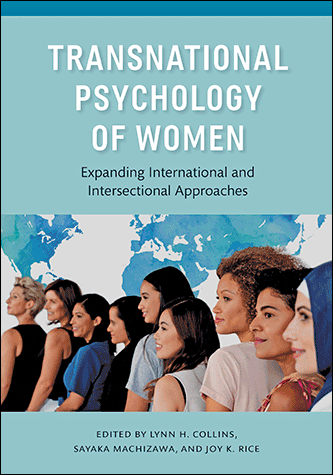 Special Projects and Achievements
Special Projects and Achievements
The ICfW became a very active voice for women within APA and our divisions through newsletter announcements, annual and mid-winter meetings, and the mounting of APA symposia and conversation hours. Our strategic planning efforts always include infusing awareness about international gender issues into APA committees, initiatives, and concerns.
In line with our aim to more broadly foster awareness of women’s issues internationally and to increase consciousness about avoiding cultural nepotism in exporting Western psychology, in 2000, a more ambitious project was born. A special ICfW task force of over 30 women, chaired by the author Mary Ballou, wrote and published a position paper on “Cultural and Gender Awareness in International Psychology. “ After four years of working with APA, CIRP, and multiple APA divisions, committees, and boards, it was extensively revised, rewritten, and adopted in August 2004 by APA’s Council of Representatives. The Resolution on Cultural and Gender Awareness in International Psychology was published in the American Psychologist and disseminated widely. The resolution recognizes the positive impact of U.S. psychology on world psychology but was written to reflect a more sensitive understanding and appreciation of the cultural and gender implications of the wholesale exportation of the goals, values, outlook, and methodology of Western psychology on the rest of the world. The APA Resolution on Cultural and Gender Awareness in International Psychology was a high point on the road to achieving our original mission awareness objective.
In collaboration with the APA Committee on Internationalizing the Psychology Curriculum, ICfW members also worked on integrating women’s issues within the curriculum in a manner consistent with the Resolution on Culture and Gender Awareness. Key questions and issues included: how do we examine and critique Western gender constructs that are often presumed to be universal, and how can non-western women’s experiences and perspectives inform the curriculum?
From 2005 to 2007, many Division 52 ICfW members and Division 35 (Psychology of Women) members worked on a special APA Task Force to produce the first set of guidelines for psychological practice with women. An intense three-year project culminated in the publication of APA Guidelines for the Psychological Practice with Girls & Women. These guidelines were passed by APA in 2007, revised in 2015, and led to a book published by APA in 2010.
By 2014 ICfW leaders saw that a new perspective on understanding the problems and concerns of impoverished women and women globally was necessary. This perspective has come to be known as “transnational,” paying tribute and recognition to the complex personal, ethnic, and social identities of women living on changing national borders as refugees and immigrants. The ICfW worked with other divisions and inter-disciplinary organizations planning for a two-day Summit on International Women in Psychology, held in Toronto before APA on August 4-5, 2015, entitled “From International to Transnational; Transforming the Psychology of Women.” The summit was chaired by Sayaka Machizawa, Lynn Collins, and the author and featured international and interdisciplinary women speakers. Task forces were formed on various topics, and the Summit led to a book on Women and Transnational Psychology, published in 2019 by APA. The Summit and book presented an important transforming perspective for women globally. The impact of COVID descending on us in 2019 cannot be overstated. Like all organizations and endeavors, it took a toll on all activities and meetings. The ICfW met virtually in 2020 and decided to pursue a special issue in Div52’s International Perspectives in Psychology (IPP) on Women during COVID-19, which was published in 2021.
In 2022 former chair Nancy Sidun, along with Merry Bullock, led a hybrid in-person and virtual ICfW meeting at the APA convention. Symposia were planned for the 2023 convention, and another special issue for IPP on reproductive justice was conceived and is in process. Most recently, in January 2023, ICfW members and former chairs had a Zoom meeting chaired by Shaifali Sandhya to discuss the history and achievements of the committee and to begin plans for revitalizing and continuing its important work and role. We are excited and hopeful that the Division 52 International Committee for Women will continue productive work in fulfilling its original mission “to identify substantive issues that affect the welfare of women globally and to recommend action to the division; to promote research, education, symposia, and projects that advance equality for women internationally; and to encourage the awareness and infusion of gender equity issues throughout the activities of the division and APA.”
References here
Robert Morgan, PH.D.

Born in the lull between the two world wars, he now shares his lifespan perspectives on today’s interesting times with us. Robert F. Morgan, Ph.D., is a Life Member of the American Psychological Association and a Fellow there of the International and Clinical Psychology divisions. First, an NIMH Pre-Doctoral Fellow at Michigan State University, he has continued with more than 50 years of post-doctoral practice and teaching experience. A former speech collaborator and project consultant for organizations including Dr. Martin Luther King Jr., he was the founding editor of the Cambridge University Press Journal of Tropical Psychology and founder of the Division of Applied Gerontology in the International Association of Applied Psychology (IAAP). He has overseen 126 psychology doctoral dissertations in California, Singapore, and Australia, along with a contemporary trauma psychology seminar at the University of New Mexico. He has published more than a hundred articles and 28 books on topics including lifespan psychology, trauma psychology in context, applied gerontology, international psychology, and even unfortunate baby names. Recent books include Trauma Psychology in Context, Time Statues, and this year’s five-book series Time Statues Revisited: On the Job, Language, Citizenship, Nonhuman Relatives, Human Family. Only semi-retired, he avoids a lethargic status he refers to as “retireded” by continuing to think and write. He also hopes to avoid that opposite error exemplified by misleading voices of our era and, of course, Lincoln’s prescient warning: “It is better to be silent and thought a fool than to open one’s mouth and remove all doubt.” Well, his readers will continue to be the judge of that. Check out the Art & Poetry Corner of this newsletter for a story by Robert!
Human Rights in Uganda: I Want to be Museveni’s Side Chic
Annah Ashaba, Uganda
In 2021, Annah wrote a poem suggesting to be the Ugandan president’s side chic, and it went viral. She was summoned by the military intelligence for questioning.

Annah Ashaba is a feminist, human rights activist, writer, and poet from Uganda. Her work intersects civic engagement, governance, menstrual health advocacy, and women empowerment. She has written poems and articles about the state of affairs in Uganda. She has a Bachelor of Arts in Education (English Language Studies and Literature in English) from Makerere University. She is a recipient of Feminist Africa’s research and publishing fellowship for the project on Violence, Gender, and Power: Violence Against Women. For this project, she’s working on the resistance experiences of women at the frontline in Uganda.
I wrote the poem “I Want To Be Museveni’s Side Chic” in October 2021. I was inspired by the sad state of affairs in my country at that time. The country had come from a violent general election. I had graduated in May 2021 as a teacher, but I could not get a job because of the closure of schools. Each time I turned on the television, I would see a parent or spouse whose child or partner had been abducted during the electoral period.
When the poem went viral, my friends and family got worried about me. They worried that I would get kidnapped, disappeared, and tortured. Their concerns were legitimate because that is what happens to writers, especially those that are critical of the 37-year-old rule of H.E Yoweri Kaguta Museveni. Some of the writers have fled to exile after being kidnapped, tortured, and charged with cases like inciting violence and disturbing the peace of the president. A week after the poem went viral, I received a call from the Deputy Director General of the Internal Security Organization (ISO). He summoned me to have a chat about the poem. I hesitated. He then said that it was not hard for his team to trace me to the last meter of wherever I was. I promised to get back to him after looking through my schedule, but he was having none of that excuse. The next day, a team of three armed soldiers came to my place and picked me up. It was around 6:30 am. I was driven so fast as if it was an emergency. The military vehicle had sirens going off to demand for the right of way from other drivers. I thought about the warnings and caution from my friends and family. I was terrified, but at the same time, I felt fulfilled because my message had reached the intended audience.
I was questioned about many things. They wanted to know the political party that I am affiliated with. They demanded to know who among the leading opposition actors I was working for. I did not find a connection between the questions and my poem. After the threats and questioning, I was given offers to choose from. I could write for the government, or I could be offered another job of my choice. After all, I was unemployed. I could even meet the president and make any wish. I looked on as the offers and threats were mentioned. I was told that my poem was an attack on the person of the president. That it was disrespectful of me to even dare think of that. Do you know what was outstanding for me during this “chat?” It is a fact that the people who were questioning and threatening me had not read the poem. They made conclusions from the title. I gained confidence after this realization. When I was asked to suggest what I wanted, I told them that I wanted my freedom to write. I told them to focus on the message in each writing instead of hunting down the messenger. They dismissed me, saying that I did not know what I wanted in life.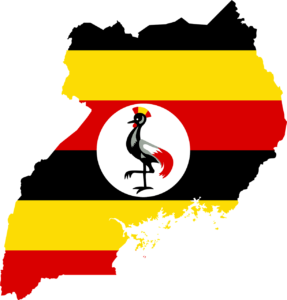
The context of the poem
Uganda had the longest school closure during the Covid-19 pandemic. From March 2020, schools were closed for almost two years. The incumbent President of the Republic of Uganda, H.E. Yoweri Kaguta Museveni, always justified this prolonged closure by saying that it was meant to protect students from contracting the deadly virus. There was a partial reopening for students in candidate classes and final-year students in Universities in October 2020.
In January 2021, Uganda held general elections where the incumbent president was declared the winner for a sixth term. The electoral campaign period was very violent. There were illegal arrests, kidnaps, and the disappearance of supporters of the leading opposition candidate, the musician-turned-politician Mr. Robert Kyagulanyi. The police and military opened fire on protesters in November 2020 when Mr. Kyagulanyi was arrested for campaigning. He was accused of spreading the deadly Covid-19 virus. On record, over 50 people were killed in this open fire. The then Minister of Security, the late General Elly Tumwine, justified the massacre of unarmed civilians, saying that the police had a right to shoot and kill anyone if that person reached a certain level of violence.
The civic space in Uganda is continuously shrinking with each passing day. It is illegal to hold peaceful demonstrations even when the right to do so is guaranteed by the Constitution. Writers who are critical of the regime’s excesses are always arrested and tortured. However, the freedom is speech and expression is enjoyed by a few. For example, during the electoral period, the first son always made controversial tweets, and he was not apprehended for it. Some of the tweets were tribalistic in nature. As we speak right now, he is busy campaigning to run for Presidency after his father leaves office. He is a serving military officer, but he has not resigned (as required by the law) to pursue a political career. In fact, he was promoted to the rank of full General in 2022, shortly after he tweeted about capturing Nairobi, the capital city of Kenya.
I want to be Museveni’s side chic
I want to be Museveni’s side chic so that during those cozy moments, I tell him that the thought
of schools still closed turns me off. I want to let him touch touch me slow and then when he’s
charged for action, I tell him that the education crisis dried my feelings. I can’t even fake
anything. I want to promise to do him all he wants as long as schools are reopened.
I want to be Museveni’s side chic so that when he asks me what car I need, I ask for an
ambulance instead and give it away to one of the hospitals. I want to start using the money he
gives me as a sugar daddy to do give back activities to the community. I know how to make
reusable pads, I could get enough capital to make this social enterprise grow and benefit many a
girl child out there.
I want to be Museveni’s side chic so that when we go for a weekend get away to graze cows; I
sweet talk him into having all the political prisoners released. I want to remind him that those
young men who were unjustly arrested have families to whom they are so dear just like the way
his cows are dear to him.
I want to be Museveni’s side chic so that when he buys me an unlimited data bundle, I thank him
and then request him to have the 12% tax on data removed. The world is advancing in science
and technology, we need to advance with it zdaddy.
I want to be Museveni’s side chic. I want to kiss his ears, gently squeeze his nipples and whisper
to him that that boy on Twitter keeps embarrassing the family every time he gets into keyboard
exchanges. Zdaddy, maybe you should reconsider opening bars too.
I want to be Museveni’s side chic so that after reading a poem for him, I tell him that censorship,
arrest, torture and imprisonment of writers is inhumane, cowardly an act and violation of rights.
Ekaraamu tejunda muzeyi. You may imprison the people but you can’t imprison the spirit of
writing. I want to tell him to take the writings as a challenge to make improvements for the
betterment of the nation.
I want to be Museveni’s side chic so that I shower him with praises as the sexiest zaddy when he
agrees to have a peaceful transition of power. We need to go somewhere in the mountains and
spend quality time as someone else able takes over the presidency. There are many men and
women with a vision; you ain’t the only one with a vision sweetie. Give the bazukulu a chance to
build the nation. Let us go plant trees, restore Bugoma forest and save those wetlands and other
endangered natural resources.
I want to be Museveni’s side chic so that I tell him what I can’t put here in writing. I am unarmed,
harmless, sexy, energetic, charismatic, patriotic and ready to read for him in retirement. Whoever
can reach him, give him this proposal of a side chic in waiting.
Division 52 Webinar Examined Internationalizing Psychology Courses
Harold Takooshian, Gabe Twose, & Luca Tateo
“How can we best internationalize our psychology curriculum?” Since the origin of APA Division 52 in 1997, one of its goals has been to help internationalize the United States (U.S.) psychology curriculum—to include more sources and concepts from outside the U.S. What is the current status of this effort, and what resources are available for instructors who want to globalize their courses? On April 21, 2023, the APA Division 52 webinar series offered a webinar on this question above, hosted by Luca Tateo.[1] This global webinar was jointly organized by APA Division 52, the APA Office of International Affairs (OIA), and the Psychology Coalition at the United Nations (PCUN). It drew 238 registrants, of whom 122 participated from 33 nations—from Algeria to Zimbabwe. The webinar was presented in three parts.
First, a background on this topic: Harold Takooshian and Elaine Congress of the PCUN noted the growing number of rich resources that have appeared since 1997 to help professors to internationalize their courses–including websites, articles, four Oxford Bibliographies, and books, including a new PCUN international book series.[2] Amanda Clinton of APA-OIA described APA’s long-term support of this trend to internationalize our courses (APA, 2005).
Second, five diverse master teachers briefly summarized their own pioneering courses in international psychology. (1) Professor Craig N. Shealy of Western Washington University. (2) Professor Michael Stevens of the University of Illinois and Critical Assessments. (3) Dean Breeda McGrath of the Chicago School of Professional Psychology. (4) Professor Dinesh Sharma of Fordham University and Steam Works Studios. (5) Professor Scott Plous of Wesleyan University and Social Psychology Network.
Third, participants held an interactive discussion on internationalizing our courses, addressing, for example, the benefits and challenges of internationalization. Speakers emphasized that Western theories of psychology are highly culture bound with limited validity and generalizability. Much Western psychology is WEIRD (Western Education, Industrialized, Rich, and Democratic), so in order to have an impact on big global topics such as climate change or extremism, we must understand other parts of the world. Individual-level outcomes include enhanced critical self-reflection, cultural humility, and social responsibility.
Thanks to Luca Tateo, a recording of this webinar appears on his Division 52 webpage. Thanks to Papa Andoh of APA, all can download many resources online: a background report (Takooshian & Congress, 2023), the five professors’ syllabi, and PowerPoint slides from the April 21 webinar.[3]
Recent Member Publications
Abi-Hashem, N. (2023). Endurance, resilience, and creativity: Transforming crises into new beginnings (Feature Article). APA’s Trauma Psychology News, 18(1), 10-17. https://heyzine.com/flip-book/46cda282b6.html
Student member Harsimran Kaur Wadhwa recently published an article on international students in The Pennsylvania Psychologist (PPA March Edition magazine; page 29). Wadhwa, H. K., & Emdur, R. (2023, March 31). International students: Their challenges and opportunities. Life’s transitions: Challenges and opportunities. https://www.papsy.org/global_engine/download.aspx?fileid=2C1B9326-4014-43DD-9BFC-F90BF706F18C&ext=pdf
Susanne Narciss and Pina Marsico recently published The International Handbook of Psychology Learning and Teaching, edited by Jörg Zumbach and Douglas Bernstein. This reference work for psychology learning and teaching takes a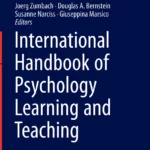 multi-faceted approach and includes international and intercultural perspectives. This handbook is a fundamental reference for those interested in how and what to teach, in training psychology teachers, in improving their own teaching, or in carrying on research on psychology learning and teaching.
multi-faceted approach and includes international and intercultural perspectives. This handbook is a fundamental reference for those interested in how and what to teach, in training psychology teachers, in improving their own teaching, or in carrying on research on psychology learning and teaching.
https://link.springer.com/referencework/10.1007/978-3-030-28745-0
Member Awards, Honors, & Accomplishments
Amanda B. Clinton awarded the Judith Gibbons award from the Interamerican Society of Psychology/Sociedad Interamericana de Psicología (SIP)
 Amanda Clinton, Sr. Director of APA’s Office of International Affairs, was awarded the Judith Gibbons Interamerican Psychology Award. This award, recommended by SIP’s members, recognizes the contributions of psychologists whose primary language is English or French, to the development of the discipline in the Americas. She will be recognized at the opening ceremony of the 39th Interamerican Congress of Psychology on June 26, in Asunción, Paraguay
Amanda Clinton, Sr. Director of APA’s Office of International Affairs, was awarded the Judith Gibbons Interamerican Psychology Award. This award, recommended by SIP’s members, recognizes the contributions of psychologists whose primary language is English or French, to the development of the discipline in the Americas. She will be recognized at the opening ceremony of the 39th Interamerican Congress of Psychology on June 26, in Asunción, Paraguay
Dr. Clinton also received the Ray Fowler Award for Staff from the American Psychological Association. This award is given annual to a staff member who has made “a significant and enduring impact on APA as an organization and who has shown a clear dedication to advancing APA’s mission.”
Erinn C. Cameron awarded Fogarty Global Health Postdoctoral Fellowship
 Erinn C. Cameron has been awarded a prestigious 2023-2024 Fogarty Global Health Fellowship with the HBNU (Harvard, Boston University, Northwestern, University of New Mexico) research consortium. She will be studying the effects of climate change on the mental health of pregnant women living with HIV in the Western Cape, South Africa. Her research is funded by an NIH research fellow training grant. The HBNU Fogarty Global Health Training Program centers around the United Nations Sustainable Development Goal 3 of improving global health and wellbeing by 2030. The expanded focus on this goal reflects the long-neglected population-level health issues that are forecasted to contribute to significant morbidity and mortality globally, specifically in low- and middle-income countries (LMICs). You can read more about the HBNU Consortium here: https://www.hsph.harvard.edu/global-health-research-partnership/
Erinn C. Cameron has been awarded a prestigious 2023-2024 Fogarty Global Health Fellowship with the HBNU (Harvard, Boston University, Northwestern, University of New Mexico) research consortium. She will be studying the effects of climate change on the mental health of pregnant women living with HIV in the Western Cape, South Africa. Her research is funded by an NIH research fellow training grant. The HBNU Fogarty Global Health Training Program centers around the United Nations Sustainable Development Goal 3 of improving global health and wellbeing by 2030. The expanded focus on this goal reflects the long-neglected population-level health issues that are forecasted to contribute to significant morbidity and mortality globally, specifically in low- and middle-income countries (LMICs). You can read more about the HBNU Consortium here: https://www.hsph.harvard.edu/global-health-research-partnership/
Erinn was also awarded the 2023 Libo Psychology Research Award from the University of New Mexico School of Medicine.
Division 52 President-Elect Pina Marsico begins her Presidency of the European Society of Learning and Teaching Psychology (ESPLAT) in June
On the occasion of the conference, our current Division 52 President-Elect, Pina Marsico, will start her Presidency of the European Society of Learning and Teaching Psychology (ESPLAT). This double presidential role may enhance fruitful collaboration in the future among these two leading international organizations. We live in a rapidly changing world where conflicts, environmental and economic issues are affecting us in many ways. How can we adapt our teaching to this changing world? The ESPLAT 2023 conference is a forum for sharing teaching and learning innovations and best practices in a changing world.
collaboration in the future among these two leading international organizations. We live in a rapidly changing world where conflicts, environmental and economic issues are affecting us in many ways. How can we adapt our teaching to this changing world? The ESPLAT 2023 conference is a forum for sharing teaching and learning innovations and best practices in a changing world.
European Society of Learning and Teaching Psychology (ESPLAT) conference will take place in Umeå, Sweden, from June 14-16, 2023
1,000 Women fill a NYC Block to get their Day Pass for the 2023 UN Women’s Conference
Photo by Harold Takooshian, PH.D.

UN Psychology Day 2023 Focused on the Promotion of Peace
Victoria Comerchero & Harold Takooshian
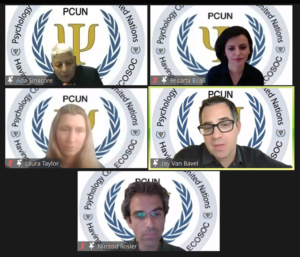
Psychology Day at the United Nations debuted on Wednesday, October 10, 2007. Almost 300 participants filled Dag Hammarskjold Auditorium in New York City to hear a series of 15 panelists and a keynote address by Professor Gerard Jacobs of the University of South Dakota on his research on “Psychology and disaster response.”
Since 2007, UN Psychology Day (UNPD) is now an annual event designed to apply psychological science to diverse global issues. This Day changes each year: its theme, organizers, expert speakers, UN mission sponsors, supporting organizations, and location. Its size also varied since 2007, from 160 in the UN Church Center in 2013 up to 400 in the massive UN Conference Room 4 in 2019. Each year, UNPD drew colleagues and students from across the USA to spend the day at the UN building in Manhattan to immerse in international psychology for the afternoon, followed by a spirited reception nearby in a New York restaurant that evening.
In 2020, UN Psychology Day changed dramatically in two ways. (a) The APA Office of International Affairs shifted its operation of UNPD to the Psychology Coalition at the UN (PCUN). (b) Due to pandemic “close-downs” starting on March 11, 2020, the Day shifted from an in-person convocation in New York City to a virtual global webinar using GoToMeeting or Zoom. This naturally changed the character of the Day in diverse ways, replacing in-person networking with a far more extensive global audience (Balva & Takooshian, 2022; Tomberge, Gopal, Neter, & Araujo-Soares, 2022).
| Year | Registrants | Participants | Nations |
| 2007-2019 | up to 400 | 160-400 | few |
| 2020, May 27 | 2,763 | 1,271+ | 104 |
| 2021, April 15 | 1,941 | 750+ | 97 |
| 2022, April 21 | 2,677 | 640+ | 107 |
| 2023, April 27 | 1,802 | 600+ | 85 |
On April 27, 2023, the 16th annual Psychology Day at the United Nations focused on the theme of “Psychological Contributions to Global Peace, Conflict Resolution, and Equity.” The Day was organized by a PCUN program committee, co-chaired by Professors Ada L. Sinacore and Caroline Temcheff of McGill University.
This Day’s participants were welcomed by Dr. Temcheff, who thanked the UN Permanent Missions of Mexico and Canada for their sponsorship and introduced David Livert, the President of PCUN. Dr. Temcheff then introduced the four speakers from three nations, who described in 20 minutes each their own diverse research programs:
- Rezarta Bilali, Ph.D. (New York University, USA), on “Transforming conflict-supporting narratives to narratives of peace.”
- Laura K. Taylor, Ph.D. (University College Dublin, Ireland), on “Developmental peacebuilding model: Implications for growing up in divided societies.”
- Jay van Bavel, Ph.D. (New York University, USA), on “The Power of us: How to build shared identity in the face of division.”
- Daniel Bar-Tal, Ph.D. (Tel Aviv University, Israel), on “Why is it so difficult to solve intractable conflicts?”
Following these four messages, Co-Chair Ada Sinacor offered integrative remarks, then moderated a lively 30-minute Q+A dialog with the global audience. The 147-minute recording can now be viewed on the PCUN website [1] along with the full program (with four speakers and their abstracts).[2] UNPD 2023 was financially cosponsored by nine NGOs.[3] Over 20 participants joined a follow-up PCUN Town Hall one week later, on May 3. Drs. Temcheff and Sinacor conducted a post-webinar survey in which 348 participants described diverse ways that they appreciated this 2023 webinar and offered their suggestions for the future.
Note: Victoria Comerchero, Ph.D., and Harold Takooshian, Ph.D., are psychologists on the faculty of Fordham University in New York City.
Early Career Professionals at APA 2023
What: Student & ECP Social- a light meal will be provided
When: Thursday, August 3rd, 6:00 pm EST
Where: Division 52 Hospitality Suite- Marriot Marquis (room #TBD)
Vote Today! Voting Closes June 7th, 11:59 pm EDT
Candidates for Student Chair-Elect 2024
Candidate Statements
Antonios Kagialis, University of Crete, Greece

I am a Master’s student in Neurosciences at the University of Crete, Greece. During my graduate and undergraduate years, I was fortunate to coordinate the local data collection of multicultural projects in Greece and Cyprus, and thus include populations from these two small countries in large international studies. I was also fortunate to be the 2022-2023 NICE (Network for International Collaborative Exchange) chair of Psi Chi, the International Honor Society of Psychology, coordinating the implementation of a cross-cultural research project. In collaboration with esteemed colleagues, this year, we increased the program’s international representation from 19 to 30 countries. During this collaboration, I also had the opportunity to mentor our student contributors from around the world, hold regular web meetings with them to hear their concerns, and provide them with support on both research-related and academic growth topics. If elected, my goal would be to further promote the activities of the division to universities both in the US and internationally. I also aim to organize and facilitate open science cross-cultural research opportunities, webinars, and conventions on cross-cultural psychology topics by taking into consideration language and time differences and mentoring and exchange programs that will benefit students irrespective of their personal or university resources. Overall, my priority is listening to the current challenges that other students face and proposing culturally sensitive strategies on how they could be resolved. Being elected would be also a great opportunity for me to further develop my mentoring, personal, and academic skills.
Olivia Mounet, M.A., Fielding Graduate University

I have had the immense honor of working closely with Division 52 in the past and have enjoyed presenting research at the annual conference previously. I am nearing the end of my doctoral journey, which has placed me firmly within the realm of social justice issues in the field of psychology. My research interests stem from a desire to challenge the homogenous Western view of psychology and push the field in the direction of globalization, culturally competent diagnostic practices, and meaningful representation within psychological research. I am currently conducting research on the misdiagnosis of personality disorders in gender-diverse populations. As a Muslim woman, having lived and worked in several countries, including Germany, Canada, and the UK, I believe I bring lived experiences to the position of student chair, as well as strong communication skills. Having worked for the last 10 years as a school psychologist, I have been afforded the opportunity to learn how to hear and advocate for individuals and families who may struggle with discrimination, lack of procedural awareness, and the feelings that go along with these challenges. My hope is to start conversations with other students and professionals in the field that query why “cultural considerations” are often an afterthought or limitation in recent literature rather than the lens through which the work is conducted. I view the position of Division 52 student chair as one of advocacy, and it would be a privilege to earn your support.
Guolin Zhang, MA., Ball State University

Being a part of the Division 52 student committee in the past years and having worked with other students with similar interests are my biggest reasons to run for the Division 52 student chair-elect position. I feel blessed that I joined the Division 52 student committee because, through this experience, I have learned so much and received so much support from the faculty and students I met here. As a Chinese international student, I sometimes do feel out of place while learning and practicing in the field of psychology. I value Division 52 as it is certainly a place where I feel seen, heard, and respected. People here value the internationalization of psychology and hope to challenge the underlying values and assumptions about psychology. I hope that if elected, I can help build an inclusive and supportive environment for other students so that they feel seen and supported and can realize and actualize their potential. I hope to continue facilitating the growth of our student committee, creating more cross-cultural mentoring opportunities for our students, and creating more research projects and field projects that advance an inclusive understanding of psychology science and psychology practices. I sincerely hope that future students will be able to feel the same way I do about Division 52 and learn and grow from their experiences here.
Division 52 Student Events at APA 2023
What: Student & ECP Social- a light meal will be provided
When: Thursday, August 3rd, 6:00 pm EST
Where: Division 52 Hospitality Suite- Marriot Marquis (room #TBD)
Division 52 Webinar Committee Chair: Luca Tateo, PH.D.
Division 52 Webinars are hour-long informational and skill-building sessions. They are open to the public, and there is an opportunity for discussion with the presenter. If you would like to suggest a webinar topic, please reach out to Luca Tateo, lucatateo@gmail.com
Border Culture, Theory, Imagination, Geopolitics
Speaker: Victor Konrad, PH.D.
Hosts: Pina Marsico & Luca Tateo
May 26th, 2023 5:00 pm UTC +2 (11:00 am EST)
Disability Rights and the Paradigm Shift: One Size Does not fit All
Speaker: Muhannad Alazzeh, PH.D.
Hosts: Luca Tateo
Moderator: Daniel Balva
June 5th, 2023 6:00 pm UTC +2 (12:00 pm EST)
International Perspectives in Psychology: Research, Practice and Consultation
Ines Meyer, School of Management Studies, University of Cape Town, South Africa
Mendiola (Joy)Teng-Calleja, Ateneo de Manila University, Quezon City, Philippines
Vol 12 • Issue 2 • 2023
(https://econtent.hogrefe.com/toc/ipp/current).
The April issue of International Perspectives in Psychology: Research, Practice and Consultation (4/2023) focuses on Building an Equitable Global Psychology- A Pioneering Effort to Give Voices to Indigenous Psychology in Southeast Asia with guest editors Rachel Sing-Kiat Ting, Kuang-Hui Yeh, Elizabeth Jones, and Darlene M. Koh.
Current calls for papers for special issues:
“Work/Organizational Psychology in Africa: Amplifying African Perspectives in the Practice and Research of Work/Organisational Psychology in Africa,” to be guest edited by Zonke Zungu, Sandiso Bazana, and Charles Tchagneno. call for papers here
“Environmental Justice and Psychology: Alternative Ideas on Environmental Issues” to be guest edited by Erinn C. Cameron, Luca Tateo, and Gonzalo Bacigalupe. call for papers here
International Psychology–Two new resources from Geneva for World Disasters and MHPSS
Kelly O’Donnell, PsyD
Resource on Disasters
I attended the launch of the World Disasters Report on 9 February at the IHQ of the International Federation of the Red Cross and Red Crescent Societies. The Report is themed “Trust Equity and Local Action–Lessons from the COVID-19 Pandemic to Avert the Next Global Crisis.“ The panel and presentations were excellent– I was especially appreciative of the remarks by Dr. Michael Ryan, who is the Executive Director of WHO’s Health Emergencies Programme. (example’ ‘trust and building trust in working with local communities is our greatest commodity’). I am sure social, peace, and community psychologists would have a lot to say about this as well! The applications are meant for health emergencies as well as for other global crises. May I encourage you to read through the succinct, informative, and very readable Executive Summary HERE— Note also that the The full Report is available in English, French, Spanish, and Arabic.
Resource on Mental Health and Psychosocial Support
The Interagency-Standing Committee (IASC) has recently published the latest guidelines by their Mental Health and Psychosocial Support Reference Group (MHPSS)– IASC Handbook, Mental Health and Psychosocial Support Coordination. It offers “standard guidance on how best to support well-coordinated and multi-sectoral MHPSS responses that are predictable, accountable, equitable, efficient and effective.” The Handbook builds upon several other guidelines by IASC, with a major foundational one being the 2007 IASC Guidelines on Mental Health and Psychosocial Support in Emergency Settings (English) which have been used widely and translated into several languages such as Arabic, Chinese, French, Japan
Note–For a good overview on how MHPSS emergency coordination is set up, watch the 17-minute recent presentation by psychologist Carmen Valle-Trabelo (coordinator of the IASC MHPSS Reference Group)–The IASC MHPSS Reference Group: History and How It Works, Carmen Valle-Trabadelo; Links for the video (17 minutes), PowerPoint, and reading list-resources.
The Night Principal
Robert F. Morgan, PH.D.
Albuquerque, New Mexico
It was 2010 in Singapore, not that long ago. I was a visiting professor at an Australian University located there. The guard at the entrance and I had both once been staff sergeants, each in the military of our own country. Soon we were good friends. One day, as I was leaving, he pointed to a bird at the top of a large tree. “Did you know that here in Singapore, we have the best-talking birds in the world?” I did not. So far, the bird songs I had noticed had only two notes and no lyrics. Apparently, this simple male competitive mating music still was enough to attract female birds of their species. He waved at the special bird on the tree to get its attention and said, “Hello! I have an American friend here.” The bird replied: “Hello! Food?” Much to the point. “Sing first,” said the guard. The bird obliged with the standard two-note song. I responded by whistling a little of the song “Stairway to Heaven.” When I finished, the bird silently contemplated me for a few seconds. Finally, it said, “Go Away!”
That was the Australian university in Singapore. The CEO had been an elementary school inspector back in his own country (spying on the teachers to keep them compliant?) and now was beyond his depth in running higher education for gifted adult students. He became an insomniac, seemingly doing all he could to reshape the university campus to be the elementary school he had once been comfortable in. This included his leasing a campus in Singapore. A former elementary school.
That seemed to have been a very good deal. Good space solid two-story construction. It had been on the market for quite some time, so it was inexpensive. There was a reason.
Chinese culture shuns talk of death lest it brings that very thing upon the speaker. Even in San Francisco, buying a house, there mandated full disclosure by the seller if anybody had died in that house. My Singaporean Chinese clinical psychology students had some struggles to learn grief counseling therefore but powered through it. The elementary school that had once thrived upon the campus was built around a very dedicated and charismatic principal. He set generations of young children on successful life paths, He was much loved.
So much so that when he died, the elementary school died with him. Before closing it completely, the principal was buried in its courtyard. His wishes were to lie where his beloved children had once played. Undisturbed, a memorial.
It worked for a long time. Singaporean businesses, eager for expansion in the small space the city-state provided, still had nobody wanting to build offices over that principal’s burial site. Yet in time it had to be on the market.
Until the Australian inspector built his campus addition on top of it. This CEO mandated elementary school hours. Even the professors were supposed to be there at daybreak and leave before dark. Life near the equator had consistent day light times, all one season all year. So this campus hummed during the day but closed down completely once the day ended. Except for me, that one day.
I was through with all the regular work by 3 PM. I walked the long red carpet arrowing past all the first-floor offices toward my office at the end by the Clinic. Just in front of the finance office, there was a rise in the path, not much, but enough so the Malaysian Finance Officer warned me to avoid tripping on it. I hadn’t noticed it before and now asked him about it. He had me step into his office. There he explained why the CEO had paid so little for this campus lease. The swelling in the carpet was above where the elementary school principal had been buried. All staff had been instructed to ignore this by the CEO, so nothing was done about it, mild tripping hazard or not. The first-floor offices had been built over the courtyard playground and the grave, with the CEO forbidding local superstition to delay his bargain. I wondered out loud if this was just a story to prank visiting professors- both of us. The Finance Officer said no, but urged me not to discuss it with anybody else. The CEO was emphatic about this and had fired a few staff just for mentioning it. His own fear? Or concerned about alienating his student financial base?
I finally made it to my office. Eager to finish the first draft of my textbook Trauma Psychology in Context. My writing style in those days was to stick with a project until it was done, no matter how long. In those healthier years of my 60s and 70s, I could tolerate working around the clock without a break. Tolerate? It was great fun. Sure, I had a heart problem with a pacemaker saving my life back at the close of the 20th century. There in Guam I had been legally dead for a while. Changed my view of the world, of life and death. An amazing experience, another story. But soon after I regained my health, I got in shape. Found joy in writing. Here years later in Singapore, this was to be one of those days.
I barely noticed when all the other people on campus had left, doors locked, and lights out. I was so close to finishing everything. I only stopped to call my wife and tell her why I would be home late. She understood.
Midnight. The light in my office was the only light on in the university campus. I could see the book draft was almost done now. Time to add photos, references, and edit. Maybe another hour or two.
An old Chinese man stood in my office doorway. I don’t recall how he was dressed except that it was unremarkable. He seemed agitated and annoyed. Pointed at the wall clock. Clearly, he thought I didn’t belong there at that hour. Let me know with gestures but without spoken words that I was to leave.
I supposed he was a night watchman. Not speaking out loud because he didn’t speak English? Strange since all employees were mandated by the CEO to only speak English at this Australian outpost.
I gestured at the work on my computer and nodded at the clock, asking by signing for a little more time; almost done. He shook his head no, still clearly put upon. Then turned and moved back into the dark building. He had made it clear that I didn’t belong there at that time of night. Though I felt he had reluctantly given me time to close and leave. One AM. I was almost done now. Just finishing touches. Loved how the book draft had shaped up. He was back.
This time with clear gestures, to leave immediately. Pointing to the wall clock again. I nodded and held up ten fingers for the pick-up time I thought I needed. Then he was gone again. I supposed he wanted me out of there before his shift was over before daylight came.
Three AM. Fully done now. Got the twelve hours I had needed. Longer by two hours than anticipated as usual. But done! As I closed up the office, the lights there flickered and went out. Footsteps approaching from the dark.
I had a flashlight and followed it outside through a side gate of the locked-down campus to the street and walked home. Very happy with the book project being completely done.
Concerned that I had upset the watchman. Tired, finally tired.
The next day at work, I asked around to see if the watchman had complained. If he was okay. He was, after all, just doing his job.
Always the same response: “What watchman?” And “The CEO would never pay somebody to watch a dark and empty building”
I wished the old man, the Night Principal, peace. Never disturbed his evening again.

I am honored to serve as the new Editor of the International Psychology Bulletin. I am dedicated to continuing the important work of the editors who came before me while also introducing new areas of content and a touch of my own quirky style. In this edition, you have read about the many exciting opportunities that will be hosted by Division 52 APA 2023 Convention in Washington, D.C., in August. I am particularly looking forward to seeing as many of you as possible at the convention. As one of this year’s programming co-chairs for our division, I will be spending a lot of time in our Hospitality Suite. Please stop by and introduce yourself. I would love to get to know you and hear your ideas for this newsletter. I hope you enjoy the Spring 2023 edition of IPB! If you are interested in joining the editorial team, please email your letter of interest and a resume to ipbdiv52@gmail.com.
Yours in service,
Erinn C. Cameron
Editor International Psychology Bulletin
Please email questions, comments, or suggestions to ipbdiv52@gmail.com. The deadline for submissions for the upcoming issue is August 15th, 2023.


